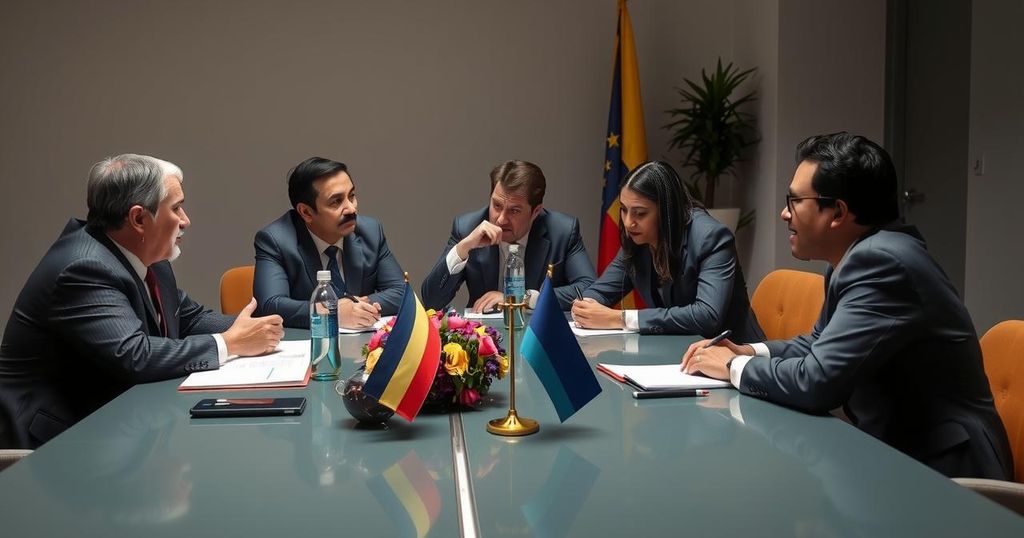Gustavo Petro’s government in Colombia is meeting considerable resistance from both established political entities and external influences as it prepares for the 2026 elections. The Historic Pact is undergoing a transformation from a coalition to a unified party in response to legal pressures imposed on smaller political groups. While endeavors to uphold the peace agreement and implement reforms are met with violence and opposition, the looming threat of lawfare and U.S. involvement complicate the political landscape, indicating that the road ahead remains fraught with challenges.
President Gustavo Petro leads a groundbreaking government in Colombia, marking a significant shift in the political landscape since he took office in 2022. The Historic Pact, striving to unify diverse Colombian interests, faces formidable challenges from established forces comprising corporations, landowners, and criminal entities. As the upcoming 2026 elections approach, prospects of re-election seem dim, exacerbated by systemic political interventions, often referred to as “lawfare,” that have historically been employed against leftist leaders in Latin America.
Petro’s administration is transforming the Historic Pact from a coalition of multiple parties into a unified political entity. This reorganization is driven by electoral regulations that threaten the existence of smaller parties if they fail to secure at least 15% of votes. Larger party formation aims to shield progressive groups from systemic harassment by the establishment. Recent gatherings of the Patriotic Union and the Colombian Communist Party have cemented this strategic alliance as they prepare for the next electoral cycle.
However, the road ahead remains fraught with obstacles, particularly regarding peace and political reforms. The Petro administration has pledged to uphold the 2016 Peace Agreement with FARC, yet violence continues to surge, with numerous social leaders and former insurgents endangered. Political adversaries, including former President Alvaro Uribe, are leveraging public fears surrounding violence to consolidate support, positioning themselves favorably for the upcoming elections.
Congressional dynamics further complicate Petro’s presidency, as the government has struggled to advance its reform agenda amid significant opposition. Attempts to implement labor, tax, and healthcare reforms have met with resistance, resulting in notable failures. Despite some achievements such as pension reform and land distribution efforts benefiting marginalized communities, setbacks have highlighted the precarious nature of Petro’s political capital.
Moreover, the use of lawfare against the Petro administration remains prominent, with challenges orchestrated by previously appointed conservative officials. Allegations of campaign finance violations and other legal actions targeting Petro and his allies indicate an ongoing attempt to undermine his government’s legitimacy and electoral viability, drawing parallels with previous anti-democratic tactics in the region.
The influence of the United States also looms large, as U.S. officials appear to favor a return to traditional power structures in Colombia. Suggestions that the U.S. government supports investigations into Petro’s campaign underscore heightened scrutiny of progressive leadership in the country, revealing the geopolitical implications of the Colombian electoral process amidst U.S.-Colombian relations. As the clocks tick towards the 2026 election, analysts predict a turbulent period, fraught with political maneuvering and resistance from entrenched interests.
The term “lawfare” has emerged in Latin America as a strategy utilized by conservative entities to weaken progressive governments through legal challenges and criminal accusations. Countries such as Paraguay, Brazil, and Honduras have witnessed similar tactics aimed at destabilizing left-wing administrations. In Colombia, President Gustavo Petro’s government, which is characterized by its pursuit of social and political reforms, finds itself in a precarious situation as these challenges intensify, leading to unresolved tensions regarding peace agreements and social justice initiatives. The convergence of multiple smaller parties into the Historic Pact reflects a strategic response to these challenges as they aim to protect their political existence in a daunting electoral landscape. Additionally, the context of U.S. involvement and support for traditional power structures complicates Colombia’s socio-political dynamics, suggesting a broader international dimension to the local struggles against progressivism.
In summary, Colombia’s political landscape is currently characterized by significant challenges faced by President Gustavo Petro and the Historic Pact. The prospects of re-election in 2026 are threatened by structural issues including lawfare, opposition from entrenched interests, and continued violence undermining peace efforts. The strategic reorganization of leftist political parties aims to enhance unity and resilience against systemic oppression, while U.S. scrutiny underscores the geopolitical implications of Colombia’s internal dynamics. As the nation approaches a critical election, the intersection of domestic politics and international influences will be pivotal in shaping its future trajectory.
Original Source: peoplesworld.org






